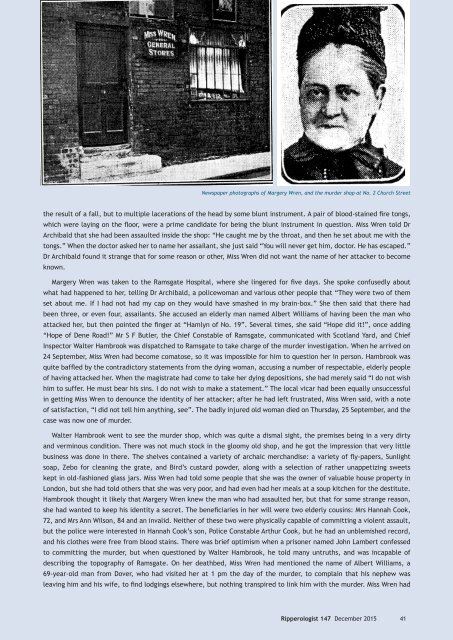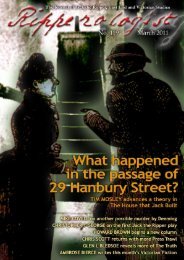Edmund Reid
nuhf574
nuhf574
You also want an ePaper? Increase the reach of your titles
YUMPU automatically turns print PDFs into web optimized ePapers that Google loves.
Newspaper photographs of Margery Wren, and the murder shop at No. 2 Church Street<br />
the result of a fall, but to multiple lacerations of the head by some blunt instrument. A pair of blood-stained fire tongs,<br />
which were laying on the floor, were a prime candidate for being the blunt instrument in question. Miss Wren told Dr<br />
Archibald that she had been assaulted inside the shop: “He caught me by the throat, and then he set about me with the<br />
tongs.” When the doctor asked her to name her assailant, she just said “You will never get him, doctor. He has escaped.”<br />
Dr Archibald found it strange that for some reason or other, Miss Wren did not want the name of her attacker to become<br />
known.<br />
Margery Wren was taken to the Ramsgate Hospital, where she lingered for five days. She spoke confusedly about<br />
what had happened to her, telling Dr Archibald, a policewoman and various other people that “They were two of them<br />
set about me. If I had not had my cap on they would have smashed in my brain-box.” She then said that there had<br />
been three, or even four, assailants. She accused an elderly man named Albert Williams of having been the man who<br />
attacked her, but then pointed the finger at “Hamlyn of No. 19”. Several times, she said “Hope did it!”, once adding<br />
“Hope of Dene Road!” Mr S F Butler, the Chief Constable of Ramsgate, communicated with Scotland Yard, and Chief<br />
Inspector Walter Hambrook was dispatched to Ramsgate to take charge of the murder investigation. When he arrived on<br />
24 September, Miss Wren had become comatose, so it was impossible for him to question her in person. Hambrook was<br />
quite baffled by the contradictory statements from the dying woman, accusing a number of respectable, elderly people<br />
of having attacked her. When the magistrate had come to take her dying depositions, she had merely said “I do not wish<br />
him to suffer. He must bear his sins. I do not wish to make a statement.” The local vicar had been equally unsuccessful<br />
in getting Miss Wren to denounce the identity of her attacker; after he had left frustrated, Miss Wren said, with a note<br />
of satisfaction, “I did not tell him anything, see”. The badly injured old woman died on Thursday, 25 September, and the<br />
case was now one of murder.<br />
Walter Hambrook went to see the murder shop, which was quite a dismal sight, the premises being in a very dirty<br />
and verminous condition. There was not much stock in the gloomy old shop, and he got the impression that very little<br />
business was done in there. The shelves contained a variety of archaic merchandise: a variety of fly-papers, Sunlight<br />
soap, Zebo for cleaning the grate, and Bird’s custard powder, along with a selection of rather unappetizing sweets<br />
kept in old-fashioned glass jars. Miss Wren had told some people that she was the owner of valuable house property in<br />
London, but she had told others that she was very poor, and had even had her meals at a soup kitchen for the destitute.<br />
Hambrook thought it likely that Margery Wren knew the man who had assaulted her, but that for some strange reason,<br />
she had wanted to keep his identity a secret. The beneficiaries in her will were two elderly cousins: Mrs Hannah Cook,<br />
72, and Mrs Ann Wilson, 84 and an invalid. Neither of these two were physically capable of committing a violent assault,<br />
but the police were interested in Hannah Cook’s son, Police Constable Arthur Cook, but he had an unblemished record,<br />
and his clothes were free from blood stains. There was brief optimism when a prisoner named John Lambert confessed<br />
to committing the murder, but when questioned by Walter Hambrook, he told many untruths, and was incapable of<br />
describing the topography of Ramsgate. On her deathbed, Miss Wren had mentioned the name of Albert Williams, a<br />
69-year-old man from Dover, who had visited her at 1 pm the day of the murder, to complain that his nephew was<br />
leaving him and his wife, to find lodgings elsewhere, but nothing transpired to link him with the murder. Miss Wren had<br />
Ripperologist 147 December 2015 41




